111 Awesome ChatGPT Prompts for Keyword Research – Step Up Your Content Game
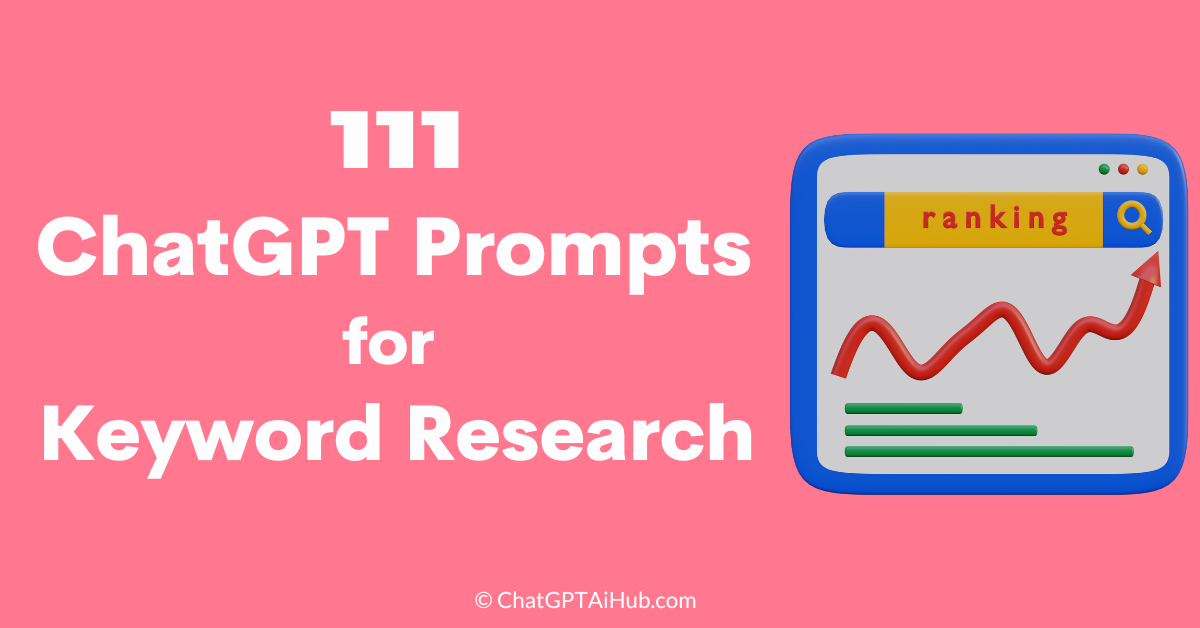
Are you tired of sifting through countless keyword suggestions in your search for relevant content? Look no further, for we have compiled a curated list of the best ChatGPT prompts for keyword research. With ChatGPT’s incredible ability to deliver specific and tailored results, you can bid farewell to the days of endless scrolling and fruitless searches. In this article, we will explore how ChatGPT prompts revolutionize your keyword research process, equipping you with the exact information you need. So, let’s dive in and discover the power of ChatGPT prompts for keyword research.
The Challenge of Relevant Keyword Discovery: Exploring the Power of ChatGPT Prompts
Finding the right keywords to drive organic traffic can be a daunting task. Traditional methods often lead to a flood of irrelevant suggestions, leaving content creators frustrated and overwhelmed. That’s where ChatGPT prompts come into play. By utilizing these powerful tools, you can now navigate through the sea of possibilities, uncovering the precise keywords that resonate with your audience’s search intent. Say goodbye to the guessing game and let ChatGPT’s prompts guide you towards keyword research success.
Enhance Your Research Efforts: Unleash the Potential of ChatGPT Prompts
With our curated list of the best ChatGPT prompts for keyword research, you can expect to save time and improve the effectiveness of your content strategy. By leveraging the power of ChatGPT, you’ll gain access to tailored keyword suggestions that align perfectly with your desired outcomes, empowering you to optimize your content for maximum visibility and engagement. Say goodbye to guesswork and unlock the potential of ChatGPT prompts for transformative keyword research.
Why ChatGPT Prompts Revolutionize Keyword Research
ChatGPT prompts revolutionizing keyword research by utilizing artificial intelligence to deliver highly tailored keyword suggestions. This precision allows you to create content that resonates with your target audience, leading to improved click-through rates, conversions, and customer engagement. Additionally, these prompts eliminate guesswork by identifying keywords that can drive substantial organic traffic, helping you stay ahead of the competition and keep your content fresh and relevant. By optimizing your content with targeted keywords, search engines recognize and rank your website higher, boosting visibility and attracting more potential customers or readers.
ChatGPT prompts empower marketers, content creators, and businesses to make data-driven decisions, resulting in improved ROI and overall business growth. In today’s competitive digital landscape, integrating these prompts into your keyword research strategy is not just a choice, but a necessity for success.
Benefits of Using ChatGPT for Keyword Research
- Enhanced creativity: ChatGPT generates fresh and creative keyword ideas, providing new perspectives for research through interactive prompts.
- Improved relevance: ChatGPT suggests related terms and long-tail keywords, aligning with your topic to discover more resonant keywords for your target audience.
- Time efficiency: ChatGPT accelerates the keyword research process by quickly providing a range of keyword suggestions based on prompts or specific questions.
- Diverse data sources: ChatGPT draws from a vast amount of internet text, generating keywords covering a broad spectrum of topics, and expanding your keyword strategy.
- Continuous learning and adaptation: Through a feedback loop, ChatGPT improves keyword quality by adapting to your needs, resulting in more effective research over time.
Discovering the Power of ChatGPT – Authentic Keyword Research Method
- Explore effective [keyword research techniques] to uncover high-performing keywords for your content. Discover strategies such as [competitive analysis], [long-tail keyword research], [semantic keyword research], and [customer intent analysis] to enhance your keyword targeting.
- Dive into the world of [keyword research tools] and discover their features and benefits. Explore popular tools like [Google Keyword Planner], [Semrush], [Moz Keyword Explorer], and [Ahrefs] to uncover valuable keyword insights and optimize your content.
- Master the art of [keyword brainstorming] to generate a comprehensive list of potential keywords. Learn techniques like [mind mapping], [seed keyword expansion], [topic clustering], and [keyword modifiers] to unlock a wealth of keyword opportunities.
- Understand the importance of [keyword metrics] in evaluating keyword potential. Explore metrics such as [search volume], [keyword difficulty], [click-through rate (CTR)], [cost-per-click (CPC)], and [keyword trends] to make informed decisions in your keyword selection process.
- Stay updated with the latest [keyword research trends] and best practices. Explore emerging trends like [voice search optimization], [mobile keyword research], [local SEO keywords], and [structured data keywords] to adapt your keyword strategy for evolving search landscapes.
- Please feel free to replace the bracketed examples with specific tools, techniques, or concepts that align with your content and requirements.
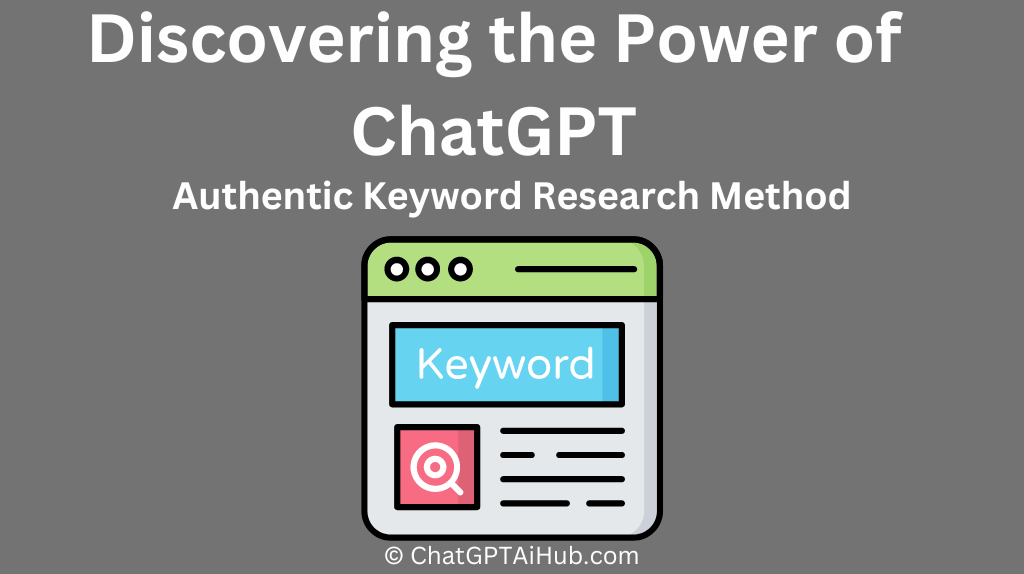
1. Primary Keyword Research Techniques
- Brainstorm and suggest effective techniques for conducting primary keyword research to optimize [your website] for improved search engine visibility. Explore strategies such as competitor analysis, customer surveys, and industry research to identify relevant keywords and improve organic search rankings for [your specific industry/niche].
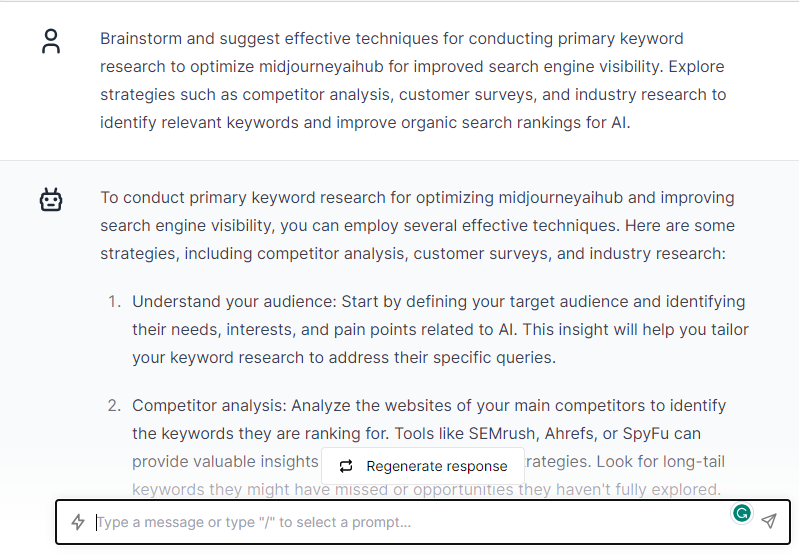
- Develop a comprehensive framework for conducting primary keyword research for [your business] to inform content creation and SEO strategies. Discuss tools and methods such as Google Keyword Planner, user intent analysis, and long-tail keyword exploration to uncover valuable keyword opportunities for [your target audience].
- Propose innovative approaches to primary keyword research for [your industry/niche] that consider the evolving landscape of search engine algorithms. Discuss concepts such as semantic keyword research, voice search optimization, and local keyword targeting to stay ahead of the curve and capture targeted organic traffic in [your specific industry/niche].
- Identify effective keyword research techniques for optimizing [your product or service] pages for search engines. Explore strategies such as seed keyword analysis, keyword mapping, and incorporating relevant keywords into title tags, meta descriptions, and headings to enhance search engine visibility for [your specific product or service].
- Create a step-by-step process for primary keyword research in [your niche market]. Discuss techniques such as analyzing search volume, competition analysis, and identifying high-converting keywords to guide content strategy and attract targeted organic traffic in [your specific niche market].
- Design a comprehensive guide to primary keyword research for [your target audience]. Explore methodologies such as social listening, customer feedback analysis, and online community research to uncover the language and terminology used by your target audience, improving keyword targeting and content relevance for [your specific target audience].
- Formulate strategies for conducting primary keyword research for [your industry] blogs or content marketing campaigns. Discuss tactics such as topic clustering, identifying user intent, and leveraging industry-specific keywords to create valuable, search-optimized content that resonates with your target audience in [your specific industry/niche].
- Generate proactive techniques for conducting primary keyword research for local businesses. Discuss methods such as location-specific keyword targeting, Google My Business optimization, and local search intent analysis to drive targeted traffic from local search queries for [your specific local business].
- Suggest primary keyword research techniques for e-commerce websites to optimize product descriptions and improve visibility in search engine results. Explore strategies such as long-tail keyword targeting, product attribute optimization, and user-generated content analysis to attract relevant organic traffic and drive conversions for [your specific e-commerce website or platform].
- Devise a comprehensive plan for conducting primary keyword research for [your content marketing strategy]. Discuss approaches such as content gap analysis, trend analysis, and leveraging user-generated content to identify keywords and topics that align with audience interests and search demand for [your specific content marketing goals].
Please replace [your website], [your business], [your industry], [your product or service], [your niche market], [your target audience], [your specific local business], [your specific e-commerce website or platform], and [your content marketing strategy] with the relevant names or concepts specific to your context.
2. Comprehensive Keyword Analysis
- Conduct a comprehensive keyword analysis for [your website or online presence] to uncover high-potential keywords and improve organic search rankings. Explore techniques such as competitor keyword research, long-tail keyword exploration, and search volume analysis to identify strategic keywords for [your specific industry/niche].
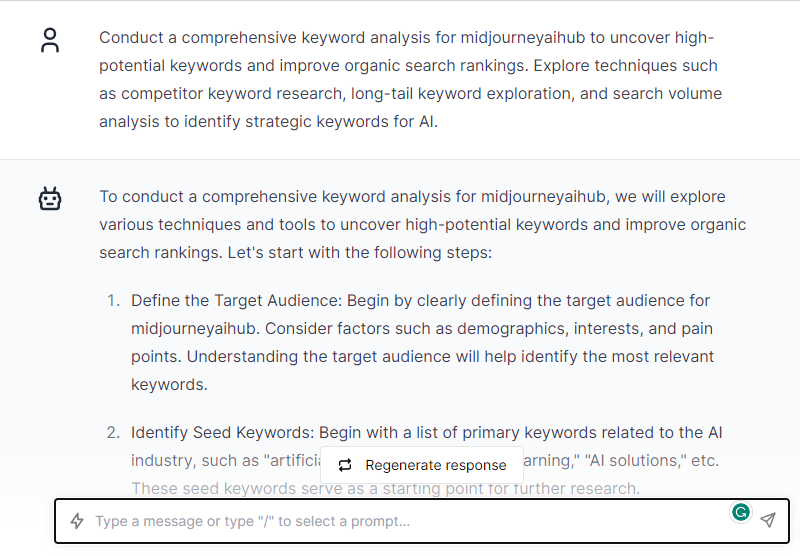
- Develop a detailed framework for conducting a comprehensive keyword analysis that encompasses [your business’s] target audience and specific market. Discuss methods such as keyword clustering, intent-based keyword research, and semantic keyword analysis to optimize content strategy and drive targeted organic traffic.
- Propose advanced keyword research techniques, such as natural language processing and machine learning, to enhance the depth and accuracy of comprehensive keyword analysis for [your specific industry/niche]. Discuss the benefits and applications of these techniques in identifying user intent and uncovering valuable keyword opportunities.
- Identify effective strategies for conducting a comprehensive keyword analysis for [your product or service]. Explore methods such as competitor keyword gap analysis, keyword trend analysis, and seasonality considerations to capture relevant search traffic and improve visibility in search engine results.
- Create a step-by-step guide for performing a comprehensive keyword analysis for [your niche market]. Discuss techniques such as keyword relevance assessment, long-tail keyword targeting, and competitive keyword benchmarking to identify untapped opportunities and optimize content for maximum visibility.
- Design an in-depth keyword analysis plan for [your target audience’s] search behavior and preferences. Explore approaches such as customer surveys, social listening, and sentiment analysis to uncover specific keywords and phrases that resonate with your target audience and drive organic traffic.
- Formulate strategies for conducting a comprehensive keyword analysis for [your industry]’s local search optimization. Discuss tactics such as location-based keyword targeting, Google My Business optimization, and local search intent analysis to capture relevant search traffic from local consumers.
- Generate innovative techniques for conducting a comprehensive keyword analysis for [your specific content marketing campaign or strategy]. Explore methods such as content gap analysis, competitor content analysis, and keyword mapping to align content creation with user intent and drive organic visibility.
- Suggest comprehensive keyword analysis techniques for optimizing [your e-commerce platform or website] for search engines. Discuss strategies such as product-focused keyword research, category keyword optimization, and user-generated content analysis to improve product discoverability and increase conversions.
- Devise a comprehensive plan for conducting a keyword analysis to support [your SEO strategy or website optimization efforts]. Discuss keyword prioritization, monitoring keyword performance, and adapting strategies based on keyword insights to continuously improve search engine visibility and organic traffic.
Please replace [your website or online presence], [your business], [your specific industry/niche], [your target audience], [your product or service], [your niche market], [your specific content marketing campaign or strategy], [your e-commerce platform or website], and [your SEO strategy or website optimization efforts] with the relevant names or concepts specific to your context.
3. Generating Keyword Ideas and Variations
- Brainstorm and suggest effective techniques for generating a wide range of keyword ideas and variations for [your website or online presence]. Explore methods such as [customer surveys], [industry trend research], [competitor analysis], and [seed keyword brainstorming] to uncover valuable keywords for [your specific industry/niche].
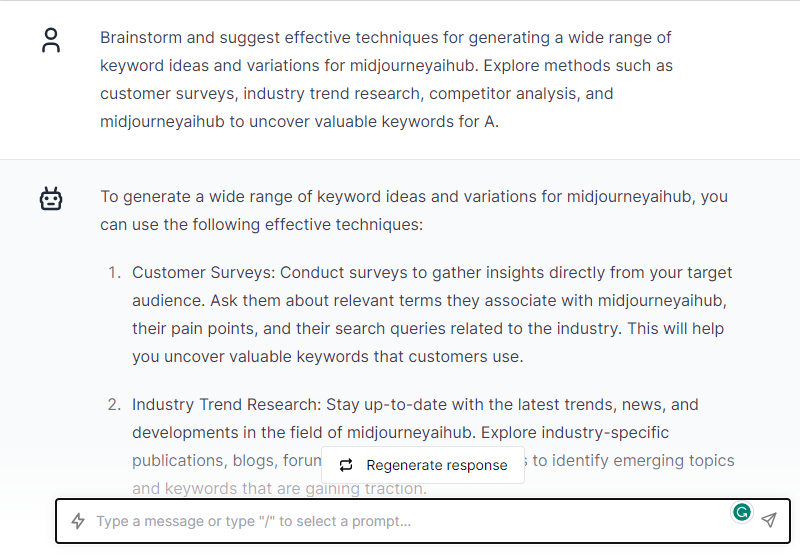
- Develop a comprehensive framework for generating keyword ideas and variations that cater to [your business’s] target audience and specific market. Discuss approaches such as [seed keyword expansion], [long-tail keyword exploration], [related keyword analysis], and [semantic keyword research] to diversify and expand your keyword portfolio.
- Propose innovative strategies for generating keyword ideas and variations by leveraging [user-generated content] and [social media conversations]. Discuss techniques such as [mining customer reviews], [analyzing social media discussions], and [incorporating user-generated keywords] to identify emerging keyword trends and niche-specific terms.
- Identify effective tactics for generating keyword ideas and variations specifically for [your product or service]. Explore methods such as [product attribute analysis], [competitor keyword gap analysis], [customer surveys], and [search query analysis] to uncover unique and targeted keywords that align with your offerings.
- Create a comprehensive plan for generating keyword ideas and variations based on [localized search intent]. Discuss techniques such as [location-specific keyword targeting], [region-specific modifiers], and [incorporating local search terms] to capture relevant search traffic from specific geographic areas.
- Design an in-depth guide for generating keyword ideas and variations that address specific [user intents] and [search query formats]. Explore concepts such as [question-based keywords], [comparison keywords], and [informational keywords] to align your content with users’ search intentions.
- Formulate strategies for generating keyword ideas and variations by exploring [niche-specific terminology] and [industry jargon]. Discuss methods such as [industry association websites], [specialized forums], and [professional networking platforms] to identify keywords that resonate with your target audience in [your specific industry/niche].
- Generate innovative techniques for generating keyword ideas and variations through the analysis of [search trends] and [user behavior]. Explore methods such as [keyword trend analysis], [seasonal keyword variations], and [search query data] to identify trending topics and seasonal search patterns.
- Suggest comprehensive keyword generation techniques for optimizing [your e-commerce platform or website]. Discuss strategies such as [product-focused keyword brainstorming], [competitor keyword analysis], and [incorporating modifiers and qualifiers] to capture specific user search queries.
- Devise a comprehensive plan for generating keyword ideas and variations to support [your content marketing strategy or SEO efforts]. Discuss techniques such as [content gap analysis], [topic clustering], [keyword mapping], and [incorporating user-generated keywords] to create a diverse and targeted keyword strategy.
Please replace the bracketed examples [customer surveys], [industry trend research], [competitor analysis], [seed keyword brainstorming], [user-generated content], [social media conversations], [mining customer reviews], [analyzing social media discussions], [incorporating user-generated keywords], [product attribute analysis], [competitor keyword gap analysis], [customer surveys], [search query analysis], [localized search intent], [location-specific keyword targeting], [region-specific modifiers], [incorporating local search terms], [user intents], [search query formats], [question-based keywords], [comparison keywords], [informational keywords], [niche-specific terminology], [industry jargon], [industry association websites], [specialized forums], [professional networking platforms], [search trends], [userApologies for the incomplete response
4. Analyzing Search Volume and Competition
- Analyze search volume and competition for [your target keywords] to identify valuable opportunities for [your website or online presence]. Explore techniques such as [keyword research tools], [search volume analysis], [competitor analysis], and [long-tail keyword exploration] to optimize your keyword strategy and improve search engine rankings.
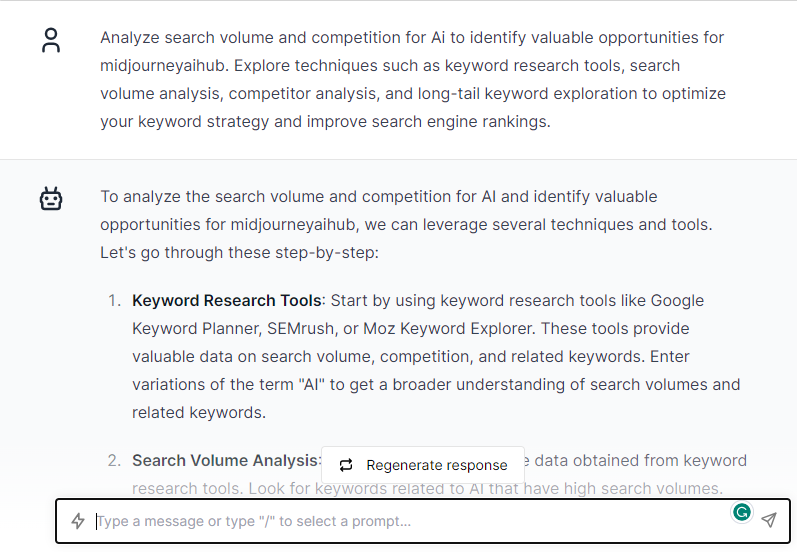
- Develop a comprehensive framework for analyzing search volume and competition in [your specific industry/niche]. Discuss methods such as [keyword difficulty analysis], [SERP analysis], [competitor keyword research], and [search trend analysis] to gain insights into keyword performance and competitiveness.
- Explore strategies for identifying low-competition, high-search volume keywords relevant to [your business or website]. Discuss approaches such as [long-tail keyword targeting], [niche-specific keyword research], [search trend analysis], and [related keyword exploration] to uncover untapped keyword opportunities.
- Propose techniques for conducting in-depth search volume and competition analysis for [your target audience’s] specific search queries. Discuss methods such as [user intent analysis], [long-tail keyword optimization], [LSI keyword research], and [competitor backlink analysis] to enhance your keyword targeting and visibility.
- Create a step-by-step guide for analyzing search volume and competition to inform [your content marketing strategy or SEO efforts]. Discuss tactics such as [keyword research tools], [search volume trends], [competitor keyword analysis], and [SERP features analysis] to identify keyword gaps, prioritize content creation, and drive organic traffic.
- Identify effective approaches for assessing search volume and competition for [your target geographic location]. Explore techniques such as [local keyword targeting], [Google Trends analysis], [location-based search volume research], and [competitor local SEO analysis] to optimize your visibility in local search results.
- Generate strategies for leveraging long-tail keywords and low-competition search queries to enhance your organic search performance. Discuss methods such as [question-based keyword targeting], [keyword variations exploration], [search volume analysis], and [competitor content gap analysis] to capture targeted search traffic and improve rankings.
- Analyze search volume and competition for [your specific industry/niche] to identify emerging trends and opportunities. Discuss techniques such as [search trend analysis], [related keyword exploration], [competitor content analysis], and [audience intent research] to stay ahead of the curve and align your content strategy with user demand.
- Suggest approaches for prioritizing keywords based on search volume and competition to maximize your [website or content] visibility. Explore methods such as [keyword difficulty analysis], [search volume trends], [competitor keyword gap analysis], and [user intent alignment] to optimize your keyword targeting and content creation efforts.
- Devise a comprehensive plan for ongoing search volume and competition analysis to monitor keyword performance and adapt your [content marketing or SEO strategy] accordingly. Discuss techniques such as [keyword tracking tools], [competitor benchmarking], [search volume trends], and [SERP feature analysis] to stay informed and make data-driven decisions.
Please replace the bracketed examples [your target keywords], [your website or online presence], [your specific industry/niche], [keyword research tools], [long-tail keyword exploration], [search trend analysis], [competitor keyword research], [your business or website], [user intent analysis], [LSI keyword research], [competitor backlink analysis], [your content marketing strategy or SEO efforts], [local keyword targeting], [Google Trends analysis], [competitor local SEO analysis], [question-based keyword targeting], [competitor content gap analysis], [related keyword exploration], [audience intent research], [your specific industry/niche],
5. Evaluating Keyword Relevance and User Intent
- Evaluate the relevance of [your target keywords] by analyzing user intent and aligning them with [your specific industry]. Explore techniques such as [user surveys] and [competitor analysis] to ensure your keywords resonate with the needs and expectations of [your target audience].
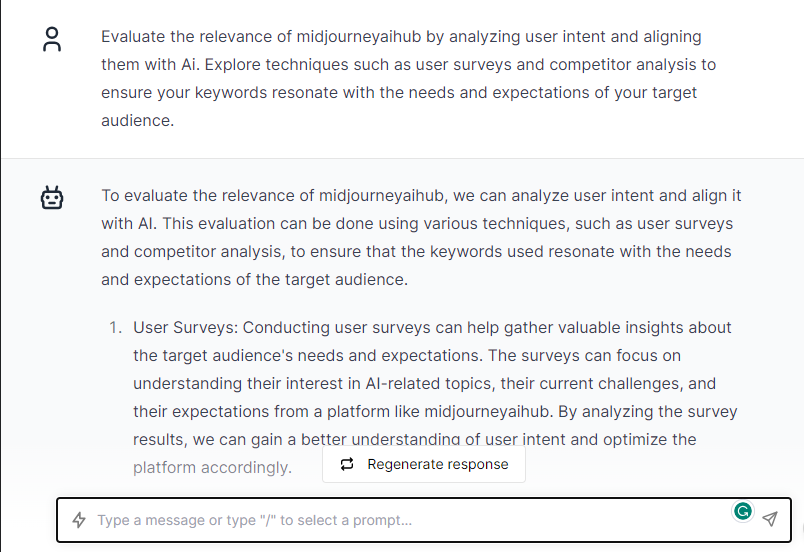
- Develop a comprehensive framework for evaluating keyword relevance and user intent in [your content strategy]. Discuss methods such as [keyword intent analysis] and [search trend analysis] to create targeted and user-centric content that matches the intent behind [user searches].
- Explore strategies for assessing the relevance of keywords to [your specific industry] by understanding [user intent] and search context. Discuss approaches such as [search query analysis] and [social media listening] to uncover the motivations and expectations of [your target audience].
- Propose techniques for evaluating the relevance of keywords based on [user intent] and search volume trends. Discuss methods such as [intent-based keyword clustering] and [SERP feature analysis] to refine your keyword targeting and enhance the user experience.
- Create a step-by-step guide for evaluating keyword relevance and user intent to drive [conversions] and [engagement]. Discuss tactics such as [landing page optimization] and [conversion rate analysis] to ensure your keywords align with [user intent] and lead to desired actions.
- Identify effective approaches for assessing keyword relevance and user intent for [your target audience’s] specific [search queries]. Explore techniques such as [intent-focused keyword research] and [content gap analysis] to create targeted and impactful content that fulfills [user needs].
- Generate strategies for evaluating keyword relevance and user intent through the lens of [your specific industry] trends and customer behavior. Discuss methods such as [industry research] and [market trend monitoring] to deliver content that resonates with [your target audience].
- Analyze the relevance of keywords by understanding the intent behind user searches in [your target geographic location]. Explore techniques such as [local search intent analysis] and [geo-targeted content optimization] to enhance the relevance of your keywords for [local users].
- Suggest approaches for evaluating the relevance of keywords in relation to [your specific product or service]. Discuss methods such as [feature-based keyword analysis] and [customer feedback analysis] to ensure your keywords align with the unique benefits and solutions provided by [your offerings].
- Devise a comprehensive plan for ongoing evaluation of keyword relevance and user intent to optimize your [content strategy]. Discuss techniques such as [regular keyword analysis] and [competitor content tracking] to adapt your keyword targeting and content strategy based on changing user needs and industry dynamics.
Please replace the bracketed examples [your target keywords], [your specific industry], [user surveys], [competitor analysis], [keyword intent analysis], [search trend analysis], [user intent], [search query analysis], [social media listening], [intent-based keyword clustering], [SERP feature analysis], [landing page optimization], [conversion rate analysis], [intent-focused keyword research], [content gap analysis], [industry research], [market trend monitoring], [local search intent analysis], [geo-targeted content optimization], [your target audience], [conversions], [engagement], [search queries], [user needs], [local users], [your specific product or service], [feature-based keyword analysis], [customer feedback analysis], [regular keyword analysis], and [competitor content tracking] with the relevant terms or concepts specific to your context.
6. Uncovering Long-Tail Keyword Opportunities
- Identify the benefits of targeting [long-tail keywords] in your [content strategy or SEO efforts]. Discuss how [long-tail keywords] can help you reach a more specific audience, increase your chances of ranking higher in search results, and drive targeted organic traffic.
- Develop a list of [long-tail keyword variations] relevant to your [industry or niche]. Explore techniques such as [keyword research tools], [competitor analysis], and [user surveys] to uncover specific search queries and optimize your content for these targeted keywords.
- Explore strategies for incorporating [long-tail keywords] into your [website’s meta tags], [headings], and [content]. Discuss approaches such as [keyword mapping], [semantic SEO], and [natural language optimization] to enhance your visibility and improve the relevance of your content for user searches.
- Propose techniques for finding high-converting [long-tail keywords] to optimize your [PPC campaigns or product listings]. Discuss methods such as [search query analysis], [customer feedback analysis], and [search trend monitoring] to identify specific search queries with high purchase intent.
- Create a step-by-step guide for conducting [long-tail keyword research]. Discuss tactics such as [using long-tail keyword tools], [analyzing search trends], [incorporating user-generated keywords], and [utilizing keyword modifiers] to uncover untapped opportunities and refine your keyword targeting strategy.
- Identify effective approaches for analyzing [long-tail keyword competition] to find the right balance between search volume and competitiveness. Explore techniques such as [competitor analysis], [search volume trends], and [SERP analysis] to prioritize the most valuable [long-tail keywords] for your [content optimization or SEO efforts].
- Generate strategies for leveraging [long-tail keywords] to optimize your [blog or content marketing strategy]. Discuss methods such as [creating in-depth guides and tutorials], [answering specific user queries], and [targeting niche topics] to attract highly engaged audiences and establish your expertise.
- Analyze the impact of [long-tail keywords] on improving user experience and reducing bounce rates. Discuss how targeting specific search queries can lead to more relevant search results, higher user satisfaction, and increased time spent on your [website or platform].
- Suggest approaches for incorporating [long-tail keywords] in your [local SEO strategy]. Discuss methods such as [targeting location-specific search queries], [optimizing for “near me” searches], and [using location-based long-tail keywords] to attract local customers and improve your visibility in local search results.
- Devise a comprehensive plan for integrating [long-tail keywords] into your [content creation process]. Discuss techniques such as [building topic clusters], [interlinking relevant content], and [regularly updating and expanding existing content] to capture long-tail search traffic and improve your overall search visibility.
Please replace the bracketed examples [long-tail keywords], [content strategy or SEO efforts], [industry or niche], [keyword research tools], [competitor analysis], [user surveys], [website’s meta tags], [headings], [content], [PPC campaigns or product listings], [search query analysis], [customer feedback analysis], [search trend monitoring], [using long-tail keyword tools], [analyzing search trends], [incorporating user-generated keywords], [utilizing keyword modifiers], [long-tail keyword competition], [content optimization or SEO efforts], [blog or content marketing strategy], [creating in-depth guides and tutorials], [answering specific user queries], [targeting niche topics], [website or platform], [localApologies for the confusion caused.
7. Refining Keyword Strategy with AI Insights
- Enhance your keyword strategy with the power of AI. Discover [AI-driven keyword research tools] that provide in-depth insights and recommendations to optimize your keyword targeting and stay ahead of the competition in [your specific industry or niche]. Explore how you can leverage AI to uncover [unique keyword opportunities] tailored to your [target audience’s preferences].
- Leverage AI insights to uncover untapped keyword opportunities. Explore [AI-powered algorithms] that analyze vast amounts of data to identify emerging trends, search demand patterns, and user intent, helping you refine your keyword strategy for maximum impact. Discover how you can integrate AI insights to uncover [new keyword variations] and identify [high-potential long-tail keywords].
- Take advantage of AI technology to analyze [user search behavior] and gain valuable keyword insights. Harness the power of [natural language processing (NLP)] and [machine learning algorithms] to understand user intent, identify semantic relationships, and optimize your keyword selection accordingly. Discover how you can use AI to uncover [user search preferences] and target [specific search queries] that align with your content.
- Supercharge your keyword strategy with AI-driven [competitor analysis]. Utilize advanced AI tools to automatically scan and analyze your competitors’ keyword usage, uncover their high-performing keywords, and adapt your own strategy to gain a competitive edge. Explore how you can use AI insights to identify [competitor keywords] and refine your [keyword targeting approach].
- Refine your long-tail keyword research with AI assistance. Discover [AI-powered solutions] that analyze search query patterns, user behavior, and contextual information to generate highly relevant long-tail keyword suggestions, helping you capture niche audiences and drive targeted traffic. Explore how you can leverage AI to identify [long-tail keyword opportunities] specific to your [target market or niche].
- Optimize your content using AI insights. Leverage AI algorithms to analyze content performance metrics, user engagement signals, and search engine ranking factors. Use these insights to refine your keyword strategy, improve content relevance, and enhance your overall search visibility. Explore how you can utilize AI to [optimize content] for [specific keywords] and improve [user engagement metrics].
- Harness the power of AI sentiment analysis for keyword research. Explore AI-driven tools that analyze user sentiments expressed in online reviews, social media posts, and forums, helping you identify keyword trends, user preferences, and sentiment-based optimization opportunities. Discover how you can use AI to uncover [user sentiment keywords] and adapt your strategy accordingly.
- Unlock the potential of AI in voice search optimization. Leverage AI technologies that process natural language queries, understand voice commands and provide valuable insights to optimize your keyword strategy for voice search and capture the growing voice-enabled market. Explore how you can use AI to [identify voice search keywords] and optimize your content for [voice search queries].
- Consider the ethical implications of using AI in keyword research. Explore topics such as data privacy, bias mitigation, and responsible AI usage to ensure that AI-driven keyword insights are obtained and used ethically, maintaining transparency and fairness. Discuss how you can [ethically leverage AI] to enhance your keyword strategy and respect user privacy.
- Develop a comprehensive keyword strategy by integrating AI insights. Leverage AI-powered tools for keyword selection, competitive analysis, content optimization, and ongoing monitoring. Continually refine and adapt your strategy based on AI-driven insights to achieve optimal results. Explore how you can incorporate [AI-powered insights] into your [keyword strategy] and [monitor keyword performance] for continuous improvement.
Please replace the bracketed examples [AI-driven keyword research tools], [AI-powered algorithms
8. Researching Target Websites and Audiences
- Conduct thorough research on [target websites or platforms] to understand their audience demographics, content topics, and engagement patterns. Identify key [audience segments] and [content gaps] that can inform your keyword targeting and content strategy.
- Explore techniques for analyzing [competitor websites] to uncover valuable insights about their target audience and content strategies. Identify [audience preferences] and [keyword trends] that can help you refine your own keyword research and content creation process.
- Use [web analytics tools] to gather data on [website traffic], [audience behavior], and [content performance] of target websites. Analyze this data to identify [highly engaged audience segments] and discover new keyword opportunities.
- Research [niche-specific websites or forums] to understand the interests and needs of your target audience. Explore discussions and conversations to uncover [common pain points], [interests], and [emerging trends] that can shape your keyword strategy and content development.
- Analyze [social media platforms] to gain insights into audience behavior, interests, and discussions related to your target topic or industry. Identify [popular hashtags], [trending topics], and [engaging content] to inform your keyword research and content creation efforts.
- Explore [online communities] and [user-generated content platforms] relevant to your target audience. Engage with the community to gather insights, identify [common questions], and discover new [keyword variations] that resonate with the community’s interests.
- Utilize [survey tools] to collect feedback directly from your target audience. Ask about their preferred [keywords], [content topics], and [information needs] to align your keyword research with their interests and optimize your content strategy accordingly.
- Conduct [interviews or focus groups] with representatives from your target audience to gain qualitative insights into their [search behaviors], [information preferences], and [keyword usage]. Use these insights to refine your keyword targeting and create more relevant content.
- Explore [industry-specific publications] and [research papers] to understand the language, terminology, and specific keywords used in your target field. Incorporate these keywords into your research to optimize your content for industry experts and professionals.
- Leverage [customer data] and [CRM systems] to gain insights into your own customer base. Analyze their demographics, preferences, and browsing behavior to identify [common search queries] and [keywords] that align with your existing customer profiles.
Please replace the bracketed examples [target websites or platforms], [audience segments], [content gaps], [competitor websites], [audience preferences], [keyword trends], [website traffic], [audience behavior], [content performance], [highly engaged audience segments], [niche-specific websites or forums], [common pain points], [interests], [emerging trends], [social media platforms], [popular hashtags], [trending topics], [engaging content], [online communities], [user-generated content platforms], [common questions], [keyword variations], [survey tools], [keywords], [content topics], [information needs], [interviews or focus groups], [search behaviors], [information preferences], [keyword usage], [industry-specific publications], [research papers], [customer data], [CRM systems], [common search queries], and [keywords] with the relevant terms or concepts specific to your context.
9. Identifying High-Quality Guest Posting Opportunities
- Discover effective strategies for identifying [high-quality websites] for guest posting opportunities. Explore [industry-specific blogs], [authority sites], and [niche publications] that align with your target audience and content niche.
- Utilize [advanced search operators] and [boolean search techniques] to find [relevant websites] that accept guest posts. Narrow down your search to [specific niches], [targeted audiences], and [desired content formats].
- Explore [blogger outreach platforms] and [guest posting networks] to connect with [influential bloggers] and [website owners] who accept guest contributions. Discover platforms that provide [vetted opportunities] for guest posting in your [specific industry or niche].
- Research [top industry blogs or publications] and analyze their guest posting guidelines. Identify [high-authority websites] with a [strong readership] and [engaged audience] that match your [target market or audience].
- Leverage [social media platforms] to find [guest posting opportunities]. Join [relevant groups or communities] where publishers and bloggers share guest posting opportunities, and connect with [website owners] who are open to guest contributions.
- Use [SEO tools] to analyze [backlink profiles] of [competing websites] and identify their [guest post sources]. Discover [trusted blogs] and [authority sites] that accept guest contributions, and reach out to them with your [valuable content ideas].
- Explore [industry-specific forums] and [online communities] to find [guest posting opportunities]. Engage with [industry professionals] and [website owners] to build relationships and discover potential platforms for sharing your expertise through guest posts.
- Connect with [industry influencers] and [thought leaders] in your niche through [social media platforms] and [professional networking sites]. Explore collaboration opportunities and discuss the potential for guest posting on their platforms or recommended websites.
- Analyze [relevant online publications] and [industry newsletters] to identify [guest contributor sections]. Explore [content guidelines] and [submission processes] to ensure your guest posts align with their quality standards and audience preferences.
- Research [niche-specific directories] and [resource lists] that curate guest posting opportunities. Identify [authority directories] and [curated lists] that can help you find websites in your [specific industry or niche] that accept guest contributions.
Please replace the bracketed examples [high-quality websites], [industry-specific blogs], [authority sites], [niche publications], [relevant websites], [advanced search operators], [boolean search techniques], [specific niches], [targeted audiences], [desired content formats], [blogger outreach platforms], [guest posting networks], [influential bloggers], [website owners], [vetted opportunities], [specific industry or niche], [top industry blogs or publications], [high-authority websites], [strong readership], [engaged audience], [target market or audience], [social media platforms], [relevant groups or communities], [SEO tools], [backlink profiles], [competing websites], [trusted blogs], [authority sites], [valuable content ideas], [industry-specific forums], [online communities], [industry professionals], [relevant online publications], [industry newsletters], [content guidelines], [submission processes], [industry influencers], [thought leaders], [professional networking sites], [relevant online publications], [guest contributor sections], [content guidelines], [submission processes], [niche-specific directories], [resource lists], [authority directories], [curated lists], and [specific industry or niche] with the relevant terms or concepts specific to your context
10. Crafting Compelling Guest Post Headlines
- Develop attention-grabbing headlines for your guest posts that resonate with [target audiences] and [capture their interest]. Explore [emotional triggers], [power words], and [benefit-driven language] to craft compelling headlines that compel readers to click and engage.
- Discover effective headline formulas for guest posts that [increase click-through rates] and [maximize engagement]. Experiment with [curiosity-driven headlines], [how-to headlines], [listicles], and [question-based headlines] to capture readers’ attention and encourage them to read your content.
- Use [keyword research] to identify [relevant keywords] that align with your guest post topic. Incorporate these keywords into your headlines to [improve search visibility] and [attract organic traffic] to your guest posts.
- Analyze [successful guest posts] in your industry or niche to uncover [headline patterns] that generate high engagement. Adapt and personalize these patterns to create compelling headlines that reflect your unique perspective and expertise.
- Explore [headline analysis tools] to assess the [emotional impact] and [headline quality] of your guest post titles. Use these insights to fine-tune your headlines and create compelling hooks that entice readers to explore your content.
- Incorporate [powerful adjectives] and [intriguing phrases] into your guest post headlines to [spark curiosity] and [create a sense of urgency]. Experiment with words like “[unveiling],” “[exclusive],” or “[game-changing]” to make your headlines stand out.
- Personalize your guest post headlines by addressing [specific pain points] or [aspirations] of your target audience. Use phrases like “[solve your biggest challenges]” or “[achieve your goals]” to establish a connection and communicate the value of your content.
- Test different headline variations using [A/B testing] to identify the most effective headlines for your guest posts. Compare metrics such as [click-through rates], [time on the page], and [social shares] to determine which headlines resonate best with your audience.
- Craft actionable headlines that promise [practical tips], [step-by-step guides], or [actionable insights]. Use words like “[master],” “[implement],” or “[transform]” to convey the tangible benefits readers will gain from your guest post.
- Consider the [branding] and [voice] of the target website when crafting guest post headlines. Align your headlines with the website’s tone and style to ensure a cohesive reading experience and increase the likelihood of your guest post being accepted.
Please replace the bracketed examples [target audiences], [capture their interest], [emotional triggers], [power words], [benefit-driven language], [increase click-through rates], [maximize engagement], [curiosity-driven headlines], [how-to headlines], [listicles], [question-based headlines], [relevant keywords], [improve search visibility], [attract organic traffic], [headline patterns], [emotional impact], [headline quality], [spark curiosity], [create a sense of urgency], [specific pain points], [aspirations], [solve your biggest challenges], [achieve your goals], [powerful adjectives], [intriguing phrases], [stand out], [specific pain points], [aspirations], [A/B testing], [click-through rates], [time on page], [social shares], [practical tips], [step-by-step guides], [actionable insights], [branding], [voice], and [target website] with the relevant terms or concepts specific to your context.
11. Utilizing ChatGPT for Competitive Analysis
- Leverage the power of ChatGPT for [competitive analysis]. Explore how ChatGPT can assist in analyzing [competitor websites], [content strategies], and [customer interactions] to gain valuable insights and identify areas for improvement.
- Discover how ChatGPT can help you uncover [competitive keywords] and [content gaps]. Utilize ChatGPT to generate [keyword suggestions], analyze competitor content, and identify opportunities to differentiate and outperform your competitors.
- Utilize ChatGPT to analyze [competitor social media strategies]. Discuss how ChatGPT can assist in identifying [engagement tactics], [content themes], and [audience targeting] used by your competitors, allowing you to refine your own social media strategy.
- Explore how ChatGPT can assist in [identifying competitor strengths and weaknesses]. Utilize ChatGPT to analyze [customer reviews], [online discussions], and [sentiment analysis] to gain insights into your competitors’ performance and identify areas for differentiation.
- Utilize ChatGPT to analyze [competitor backlink profiles] and [link-building strategies]. Discover how ChatGPT can help you identify [high-quality backlink opportunities] and develop an effective link-building strategy to improve your website’s authority and search engine rankings.
- Leverage ChatGPT to gain insights into [competitor pricing strategies] and [product positioning]. Discuss how ChatGPT can assist in analyzing [pricing models], [product features], and [customer perceptions] to refine your own pricing and positioning strategies.
- Utilize ChatGPT to analyze [competitor advertising campaigns]. Explore how ChatGPT can assist in understanding [ad copy], [targeting strategies], and [ad performance metrics], allowing you to optimize your own advertising efforts.
- Discover how ChatGPT can assist in [monitoring competitor content] and [tracking industry trends]. Utilize ChatGPT to analyze [content topics], [keywords], and [engagement metrics] to stay updated on the latest industry trends and create relevant and timely content.
- Utilize ChatGPT to analyze [competitor customer support interactions]. Discuss how ChatGPT can help analyze [customer queries], [support ticket trends], and [response strategies] to improve your own customer support processes and enhance the overall customer experience.
- Explore the benefits of using ChatGPT for [competitor analysis in specific industries]. Discuss industry-specific use cases where ChatGPT can assist in analyzing [competitor data], [market trends], and [customer preferences] to inform your strategic decision-making.
Please replace the bracketed examples [competitive analysis], [competitor websites], [content strategies], [customer interactions], [competitive keywords], [content gaps], [keyword suggestions], [competitor social media strategies], [engagement tactics], [content themes], [audience targeting], [identifying competitor strengths and weaknesses], [customer reviews], [online discussions], [sentiment analysis], [competitor backlink profiles], [link-building strategies], [high-quality backlink opportunities], [competitor pricing strategies], [product positioning], [pricing models], [product features], [customer perceptions], [competitor advertising campaigns], [ad copy], [targeting strategies], [ad performance metrics], [monitoring competitor content], [tracking industry trends], [content topics], [keywords], [engagement metrics], [competitor customer support interactions], [customer queries], [support ticket trends], [response strategies], [competitor analysis in specific industries], [competitor data], [market trends], and [customer preferences] with the relevant terms or concepts specific to your context.
Final Thoughts:
In conclusion, ChatGPT prompts provide a revolutionary solution for keyword research, optimizing content creation, and marketing strategies. With tailored suggestions and precise keyword alignment, these prompts alleviate the challenge of finding relevant keywords, saving time, and enhancing effectiveness. By implementing ChatGPT prompts, content creators can unlock the potential of keyword research, resonating with audiences and driving higher engagement and conversions. Embrace the power of AI-driven keyword research and elevate your content game to achieve greater success in your online presence.
FAQs
Can I use ChatGPT for keyword research?
Yes, you can use ChatGPT for keyword research.
How do I ask ChatGPT for keyword research?
You can ask ChatGPT for keyword research by providing a topic or a specific question related to keywords.
What questions should I ask for keyword research?
Some example questions for keyword research are: “What are the most popular keywords related to [topic]?” or “Which long-tail keywords can be targeted for [specific goal]?”
What are the ChatGPT prompts for search engines?
There isn’t a specific set of prompts for search engines, but you can ask questions like “What are the top search queries for [topic]?” or “What keywords have high search volume in [industry]?”

